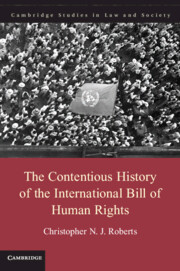Book contents
- Frontmatter
- Contents
- Preface
- Acknowledgments
- Introduction
- Chapter 1 What Are Human Rights and Where Do They Come from?
- Chapter 2 From War and Politics to Human Rights: The Cold War and Colonial Recession
- Chapter 3 Protecting State Sovereignty from the “Dangers” of Human Rights
- Chapter 4 Saving Empire: The Attempt to Create (Non)-Universal Human Rights
- Chapter 5 A Human Rights Treaty that Permits Lynching?
- Chapter 6 The United States’ Unequivocal Ambivalence toward Socioeconomic Rights
- Epilogue
- Index
- References
Chapter 3 - Protecting State Sovereignty from the “Dangers” of Human Rights
Published online by Cambridge University Press: 05 November 2014
- Frontmatter
- Contents
- Preface
- Acknowledgments
- Introduction
- Chapter 1 What Are Human Rights and Where Do They Come from?
- Chapter 2 From War and Politics to Human Rights: The Cold War and Colonial Recession
- Chapter 3 Protecting State Sovereignty from the “Dangers” of Human Rights
- Chapter 4 Saving Empire: The Attempt to Create (Non)-Universal Human Rights
- Chapter 5 A Human Rights Treaty that Permits Lynching?
- Chapter 6 The United States’ Unequivocal Ambivalence toward Socioeconomic Rights
- Epilogue
- Index
- References
Summary
Introduction
The United States government pursues a strong human rights agenda in international matters. But in national politics the term is rarely, if ever, uttered with respect to US citizens. This practice of strong international support for human rights amidst domestic silence is often considered under the broad banner of American exceptionalism – a concept, a practice, a civic creed that appears at once in opposing normative lights. On one side of the issue, there are those who argue that the United States boasts an illustrious history of rights – a shining city on the hill that has fought for, honored, and set the standard for the modern world. Others, however, are much less forgiving of the United States’ exceptional stance on human rights. The reluctance to ratify basic human rights treaties such as the International Covenant on Economic, Social, and Cultural Rights (ICESCR) relegates it to an outlier status among developed nations, making it more of an isolated citadel than a shining city. In recent years the question of whether the nation’s bifurcated approach to human rights is a good thing or not has made for lively debate among small circles of scholars, activists, lawmakers, and jurists. In truth, however, there is relative quiet on the issue. For most Americans the nation’s domestic silence on human rights amidst its strong international support is an accepted fact – no more a subject to debate than the ground upon which one walks.
- Type
- Chapter
- Information
- Publisher: Cambridge University PressPrint publication year: 2014

